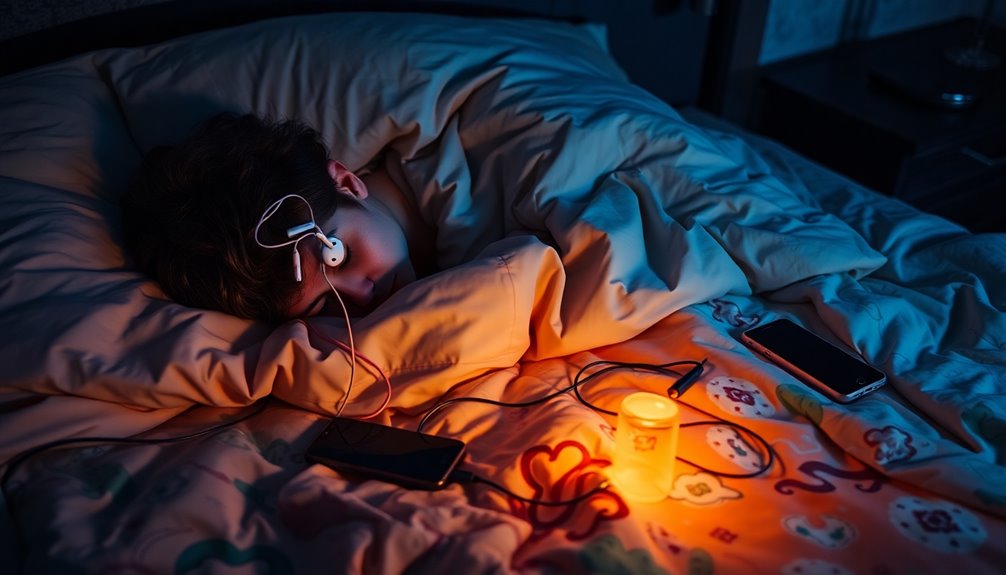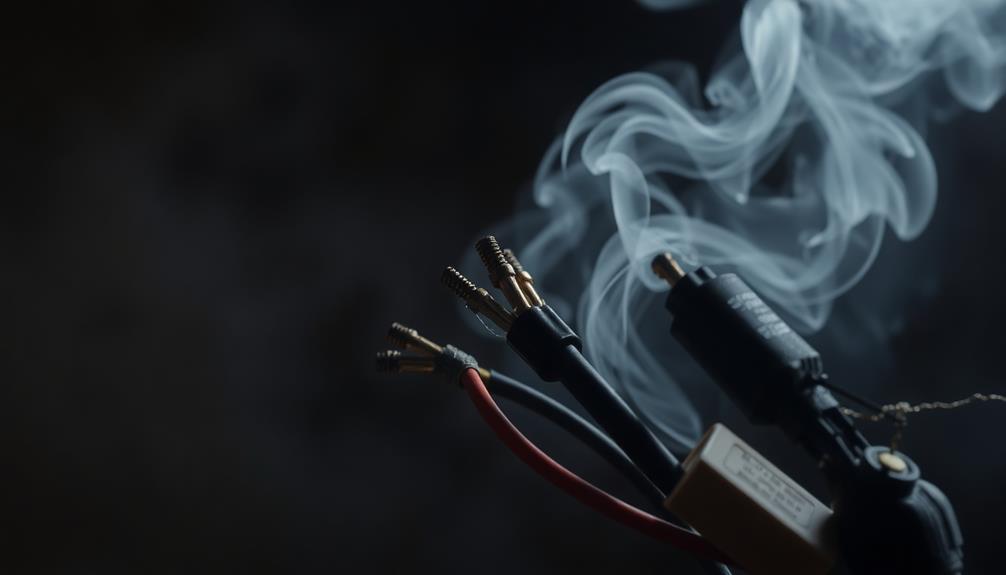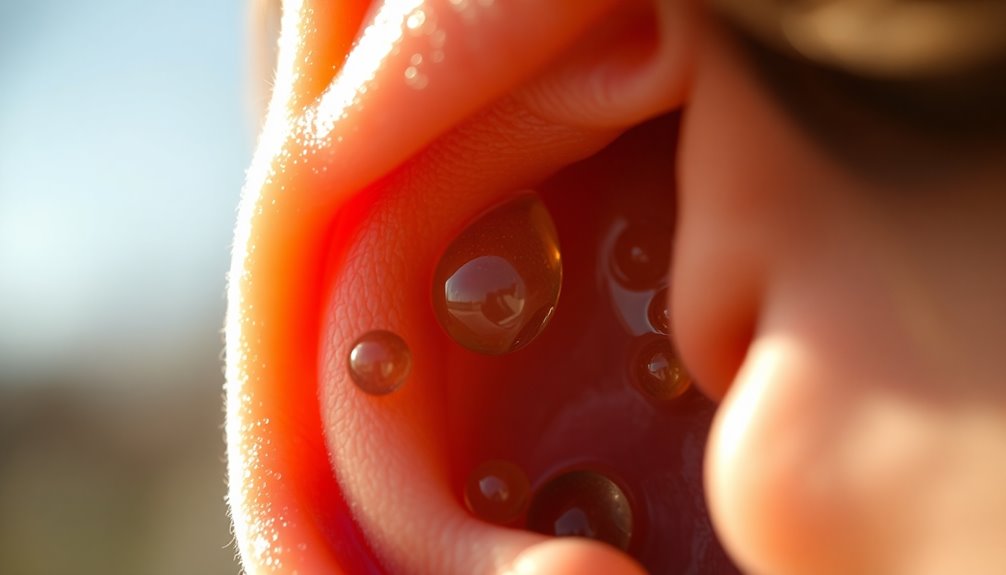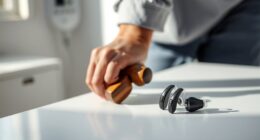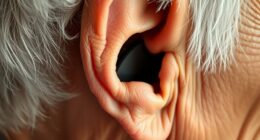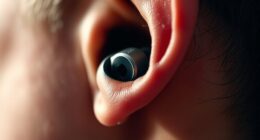Sleeping with AirPods can pose several hidden dangers you might not realize. The snug fit can trap moisture, increasing the risk of bacterial infections in your ears. Prolonged use also risks hearing damage from high volumes, even at lower sound levels. You may find discomfort while sleeping, especially if you're a side sleeper, disrupting your sleep quality. Plus, reliance on AirPods could hinder your adaptability to different sleeping environments. Regular cleaning of your earbuds is crucial for hygiene. If you're curious about safer alternatives and the long-term implications, there's much more to explore on this topic!
Key Takeaways
- Prolonged use of AirPods can lead to ear infections due to trapped moisture and bacteria in the ear canal.
- Wearing AirPods while sleeping may disrupt natural sleep cycles, reducing deep sleep quality and overall rest.
- Dependence on AirPods for sleep can hinder adaptability to different environments, impacting sleep quality and mental well-being.
- Regular use at high volumes increases the risk of noise-induced hearing loss and tinnitus over time.
- Improper fit of AirPods can cause physical discomfort, earaches, and potential injuries to the ear.
Ear Health Risks

When you sleep with AirPods, you risk compromising your ear health in several ways. First, the snug fit of earbuds can lead to moisture and earwax accumulation in your ear canal. This warm, damp environment is perfect for bacteria to thrive, increasing your chances of developing painful ear infections. The natural self-cleaning process of your ears gets disrupted when you block them with earbuds, leading to impacted earwax over time. Additionally, prolonged use of earbuds without cleaning can worsen ear hygiene, making you more susceptible to infections.
Chronic ear infections can strike both adults and teens, but children are particularly vulnerable due to their smaller ear canals. If you ignore the signs, these infections can escalate into more severe health issues. You might also experience discomfort or soreness from the pressure of the AirPods, especially if they get dislodged during sleep.
To combat these risks, it's crucial to clean your earbuds regularly—at least once a week with alcohol—and avoid sharing them with others. Limiting your usage and ensuring a proper fit can also help protect your ear health. So, consider these factors before drifting off with your AirPods in. Your ears will thank you!
Hearing Damage Potential
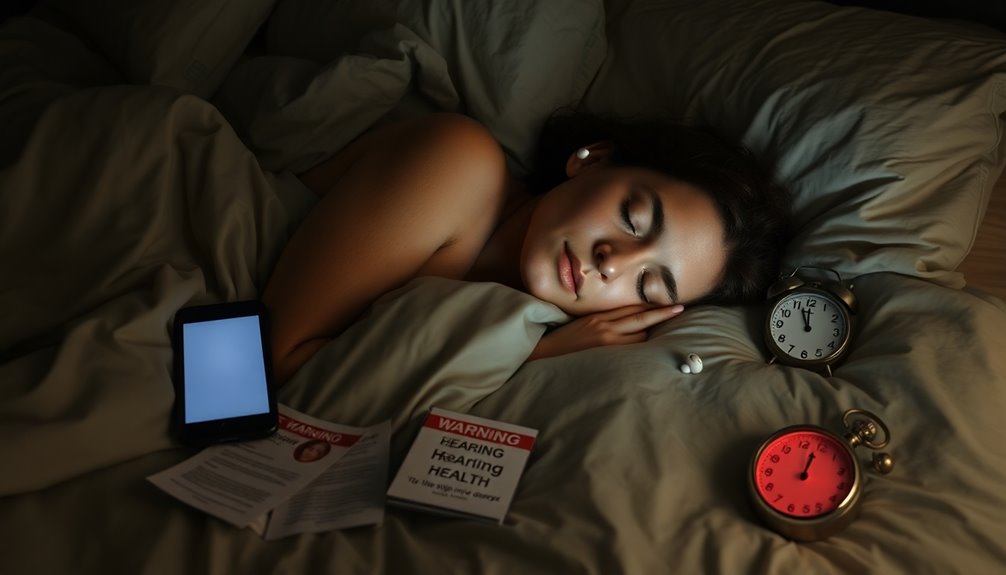
Sleeping with AirPods may seem convenient, but it's important to understand the potential risks to your hearing. Prolonged exposure to loud music can lead to noise-induced hearing loss, especially when you listen at volumes exceeding 100 decibels. The World Health Organization recommends keeping sound levels below 85 decibels for safe exposure, even for up to eight hours daily. When you're asleep, you might not even be aware of the volume, increasing the risk of damage.
Additionally, high-volume use can trigger or worsen tinnitus—a condition characterized by ringing or buzzing in your ears. This can happen when your ears don't get enough time to recover from loud sounds. Even at lower volumes, long sessions can strain your ears, leading to gradual hearing deterioration over time. Using headphones while sleeping may also help block out external noise, which can contribute to improved sleep quality but should be balanced with caution to protect your hearing.
The cumulative effect of extended use, particularly during sleep, amplifies the risk. It's essential to monitor your listening habits and give your ears regular breaks from sound exposure. Practicing safe listening by controlling volume levels can help protect your hearing health in the long run. Remember, your ears deserve care and attention, even when you're trying to relax.
Sleep Quality Interference
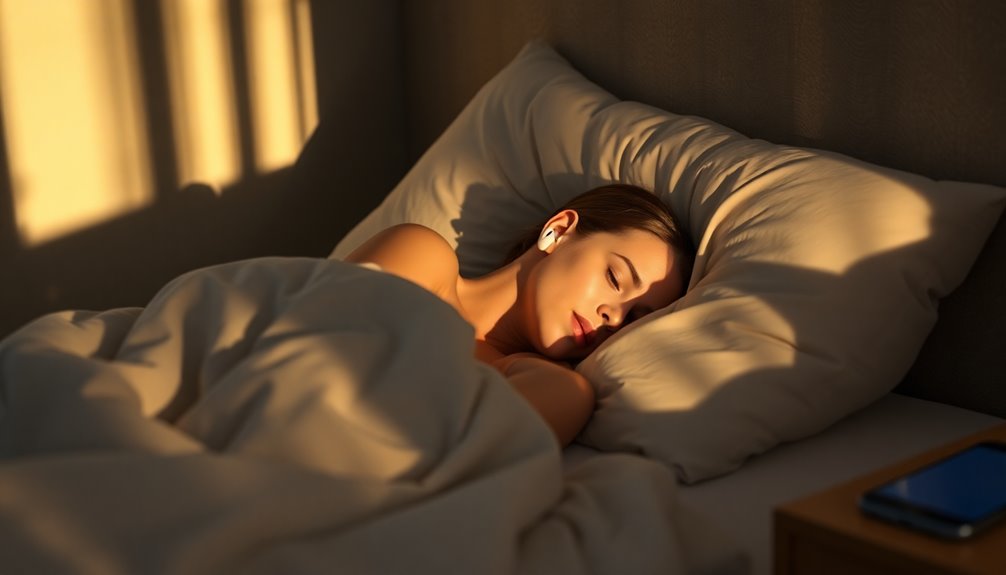
Using AirPods at night can really throw off your sleep quality. They disrupt your natural sleep cycles, particularly impacting deep sleep stages. This leads to less restorative sleep and can result in frequent disturbances during the night. When you rely on AirPods to fall asleep, you may find it tough to drift off without them, creating a dependence that complicates your sleep routine. If you ever need to sleep without your device, it could cause further disruptions.
Additionally, the presence of AirPods can introduce discomfort, especially when you sleep on your side. This physical pressure can interfere with your ability to stay asleep. Plus, trapped moisture and bacteria might increase the risk of ear infections, further jeopardizing your rest. Moreover, using AirPods as hearing aids can lead to ear-related complications that could affect your overall health and comfort during sleep. Prolonged exposure to loud sounds, such as those from your AirPods, can contribute to noise-induced hearing loss over time, compounding the issues related to sleep disturbances. Hearing loss can also impact your emotional well-being, potentially leading to increased anxiety and stress levels.
Instead of relying on AirPods, consider establishing a relaxing bedtime routine or using a white noise machine positioned safely away from your bed. This way, you can maintain a more consistent sleep pattern without the drawbacks of earbuds. Focus on creating an environment conducive to sleep, and you'll likely notice improvements in your overall sleep quality.
Physical Discomfort Issues

Prolonged wear of AirPods can lead to significant physical discomfort, particularly in the sensitive ear canal. You might notice pressure building in your ears, especially if you're a side-sleeper. The weight and fit of the AirPods can create earaches and soreness, disrupting your sleep and diminishing its quality.
Moreover, wearing AirPods can contribute to earwax accumulation and moisture in the ear canal. This moisture can promote bacterial growth, increasing your risk of external ear infections. If you're not careful, you might push wax deeper into your ears, leading to even more discomfort and irritation. Prolonged use of headphones can lead to irreversible damage to your hearing health if proper precautions aren't taken.
In addition to these issues, AirPods can cause scratches and injuries to your ears, particularly if they aren't the right size. Larger models might feel bulky and cause a sense of fullness, while smaller ones could slip deeper into your ear canal. Finding the right fit is crucial to minimize damage and discomfort. Consider investing in earbuds designed for sleep, as they're typically smaller and softer. Regular breaks from wearing AirPods will also help your ears breathe and recover from any pressure or irritation.
Battery Safety Concerns
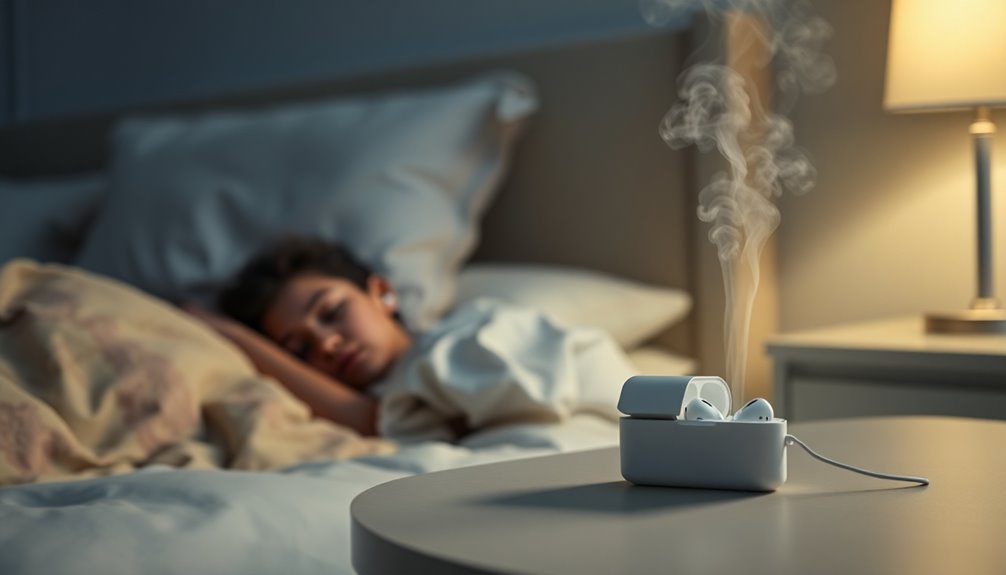
When you rely on AirPods for your audio needs, it's crucial to consider battery safety concerns. AirPods are equipped with safety mechanisms, like temperature sensors and circuit protection systems, to prevent overheating and overcharging. Apple's rigorous testing ensures they comply with industry safety standards, reducing the risk of battery-related mishaps. AirPods are designed with safety features to mitigate risks associated with battery usage.
To keep your AirPods safe, always charge them using the specified case and cable. Using damaged or third-party equipment can lead to overheating. Regularly check your battery health on your iOS device and replace the batteries as needed. Avoid attempting to replace AirPods or charging case batteries yourself, as this can cause damage and increase risks.
Additionally, store your AirPods in a cool, dry place, steering clear of direct sunlight and heat sources. Avoid prolonged skin contact while charging, and never sit or sleep on the charging case or cables. Be cautious in environments with industrial chemicals or extreme conditions. Ignoring these safety instructions can lead to fire, electric shock, or injury. By following these guidelines, you can enjoy your AirPods with peace of mind, minimizing potential dangers while you sleep.
Dependency on AirPods

Relying heavily on AirPods for sleep can create a troubling dependency that disrupts your natural sleep patterns. When you become accustomed to using them, you might find it increasingly difficult to fall asleep without them. This reliance can hinder your ability to sleep in different environments or without the device, leading to poorer sleep quality and reduced restorative sleep. Additionally, maintaining emotional alignment through healthy sleep habits is crucial for overall well-being and emotional intelligence.
Psychologically, using AirPods as a sleep aid can foster a dependence that makes changing your sleep habits challenging. The comfort associated with having them can overshadow their potential negative impacts. If you find yourself anxious or stressed when your AirPods are unavailable, it's a clear sign of this dependence. Furthermore, using in-ear headphones can lead to serious health issues, including earwax build-up, which may complicate your ear health over time. In addition, prolonged use of headphones can contribute to chronic diseases like ear infections or hearing loss. Studies have shown that chronic inflammation may also be exacerbated by such dependencies, impacting overall health. Understanding the role of emotional dysregulation can help you recognize patterns in your reliance on sleep aids.
Practically speaking, if your AirPods get lost, damaged, or run out of battery, your sleep can suffer significantly. The need to recharge or replace them can disrupt your routines, and physical discomfort from using them may also impact your sleep quality. Long-term reliance not only affects your sleep but can also lead to ear health issues and potential injuries. It's essential to consider these implications and explore alternative methods for relaxation and sleep.
Hygiene and Cleaning Practices
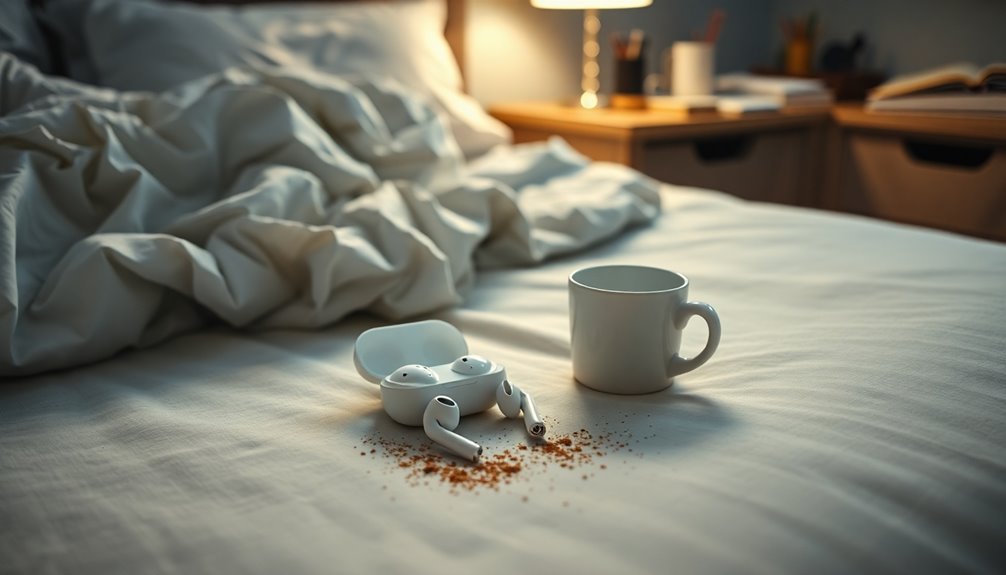
Maintaining your AirPods' hygiene is crucial for both your ear health and the longevity of the device. Sleeping with them can trap moisture in your ear canal, creating a breeding ground for bacteria. This increases your risk of outer ear infections, like Otitis Externa. Scratches from your AirPods can also make your ears more vulnerable to infection, especially when you use them for extended periods. Additionally, excessive moisture can exacerbate skin conditions, leading to irritation. Regular cleaning of your AirPods not only prevents infections but also ensures that you enjoy better sound quality during use.
To prevent these issues, clean your AirPods regularly. Start by using micellar water with PEG-6 Caprylic/Capric Glycerides to clean the meshes, employing a soft-bristled children's toothbrush for gentle, circular motions. Rinse with distilled water and let them dry completely for at least two hours. Always wipe the body with a cloth dampened in fresh water to avoid stains. Cleaning all meshes on your AirPods is essential to ensure optimal hygiene and sound quality.
After workouts or exposure to liquids, clean your AirPods to prevent skin irritation. Avoid sharp objects while cleaning, and use a soft, dry cloth to maintain the charging case. Neglecting these practices can lead to persistent infections, reduced sound quality, and even long-term hearing damage. Prioritize hygiene to enjoy your AirPods safely and effectively.
Alternatives for Better Sleep

If you're struggling to get a good night's sleep while using AirPods, exploring alternatives can make a significant difference. Consider comfortable sleep headphones like the Bose Noise Cancelling Headphones 700, which offer up to 20 hours of battery life and are perfect for back sleepers. If you prefer a budget-friendly option, Cozyphones provide comfort in any sleep position, though they have basic audio quality.
For effective noise cancellation, try the QuietOn 3.1 Sleep Earbuds. They reduce consistent sounds without active cancellation, fitting snugly with foam tips. The Sony WF-1000XM4 offers active noise cancellation and a long-lasting battery, while Soundcore Life Q30 boasts up to 40 hours of playback. These headphones are designed with comfort for various sleep positions in mind, ensuring you can find the perfect fit for your needs. Additionally, it's important to consider the impact of sleep quality on overall health, as poor sleep can lead to various health issues, including increased risk of anxiety and depression. Moreover, establishing healthy boundaries around your sleep environment can significantly enhance your ability to rest peacefully. Furthermore, maintaining personal resilience through quality sleep can boost your overall mental health and coping strategies. In commercial spaces, maintaining consistent indoor temperatures is crucial for employee productivity and comfort, similar to how a good night's sleep affects personal well-being.
If you're after a combination of features, Kokoon Nightbuds track your sleep and use intelligent audio fade-out to help you drift off. For a unique design, consider the LC-Dolida Sleep Mask and Headphones, which can block light and sound simultaneously. By choosing one of these alternatives, you can enhance your sleep quality without the drawbacks of AirPods.
Long-Term Health Implications

Using AirPods while sleeping may seem convenient, but it can lead to several long-term health implications that are worth considering. Prolonged exposure to audio at high volumes can damage your hearing, with even low volume levels straining your ears over time. The World Health Organization suggests limiting sound exposure to 85 decibels for eight hours daily, but using AirPods can easily push that limit, potentially resulting in noise-induced hearing loss or tinnitus.
Additionally, wearing AirPods during sleep can obstruct the ear canal, trapping moisture and earwax, which may foster bacterial growth. This increases your risk of infections, especially if you don't clean your earbuds regularly. Children are particularly vulnerable to these issues due to their smaller ear canals.
Moreover, AirPods emit radiofrequency radiation, classified as a possible carcinogen. Prolonged exposure might raise your risk of thyroid nodules and other health concerns, especially since Bluetooth technology operates on a 2.4 GHz ISM band, which may have unexamined effects on health.
Finally, relying on AirPods can disrupt your sleep quality, leading to less restorative rest and physical discomfort. In the long run, these factors can significantly impact your overall well-being, making it essential to rethink your bedtime routine.
Frequently Asked Questions
Can I Use Airpods While Sleeping on My Side?
Sure, you can use AirPods while sleeping on your side, but it might not be the best choice. The pressure from your pillow can cause discomfort, and they might get dislodged easily, increasing the risk of injury. Plus, they can lead to earwax buildup and potential infections if you don't keep them clean. You might want to consider alternatives like white noise machines for a more comfortable and healthier sleep experience.
How Can I Tell if My Airpods Are Too Loud?
To tell if your AirPods are too loud, check the volume on your device. If you're struggling to hear conversations around you or if others can hear your music, it's likely too loud. Use the Health app to monitor audio exposure and set limits in your settings. Remember the 60/60 rule: listen at 60% volume for a maximum of 60 minutes, and take breaks to protect your hearing.
Are There Specific Airpods Designed for Sleeping?
No, there aren't any specific AirPods designed for sleeping. While AirPods, particularly the Pro model, offer noise cancellation features, they're not tailored for comfort during sleep. Their shape can be uncomfortable for side sleepers, and they lack features like adjustable fittings or extra cushioning. If you're looking for sleep-friendly options, consider specialized sleep headphones like QuietOn 3.1 or Bedphones, which are made with comfort and extended use in mind.
How Often Should I Clean My Airpods?
You should clean your AirPods every 72 hours of usage if you use them frequently. If you're a regular user, aim for once a week. Pay attention to visible dirt or wax buildup, as it can affect sound quality and hygiene. Regular cleaning not only maintains audio performance but also prevents bacterial growth. Make sure to use a lint-free cloth and avoid sharing to keep your AirPods in top shape.
Do Airpods Affect Sleep Apnea or Other Sleep Disorders?
AirPods can potentially affect sleep apnea and other sleep disorders. If you rely on them for audio while sleeping, the continuous sound may disrupt your natural sleep cycles, possibly worsening apnea symptoms. Additionally, the discomfort from wearing them might lead to restlessness during the night. It's crucial to evaluate how they impact your sleep quality and overall health, especially if you're already dealing with sleep-related issues.
Conclusion
In conclusion, while sleeping with AirPods might seem convenient, it's important to recognize the potential risks involved. From ear health issues and hearing damage to sleep quality interference, the drawbacks can outweigh the benefits. Plus, concerns about battery safety and hygiene shouldn't be ignored. Consider exploring alternatives for a more restful night's sleep. Your ears, overall health, and sleep quality will thank you for making a mindful choice.
